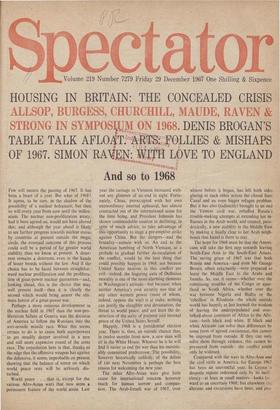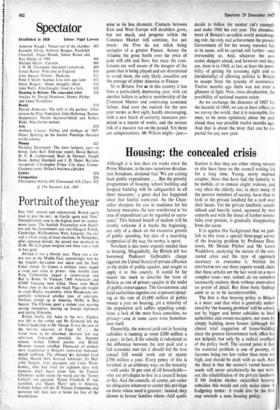And so to 1968
Few will mourn the passing of 1967. It has been a beast of a year. But what of 1968? It opens, to be sure, in the shadow of the possibility of a nuclear holocaust; but then so will every year from now until the millen- nium. The nuclear non-proliferation treaty, had it been agreed on, would not have altered this; and although the year ahead is likely to see further progress towards nuclear status, by countries at present outside the magic circle, the eventual outcome of this process could well be a period of far greater world stability than we know at present. A deter- rent remains a deterrent, even in the hands of lesser breeds without the law. And if the choice has to be faced between straightfor- ward nuclear proliferation and the prolifera- tion of great-power nuclear guarantees—and, looking ahead, this is the choice that may well present itself—then it is clearly the second which would bring nearer the ulti- mate horror of a great-power war.
Perhaps a more ominous development in the nuclear field in 1967 than the non-pro- liferation failure at Geneva was the decision of America to follow the Russians into the anti-missile missile race. What this seems certain to do is to cause both superpowers to get steadily deeper involved in a new and still more expensive round of the arms race. The consolation here is that, thanks to the edge that the offensive weapon has against the defensive, it seems improbable on present showing that the balance of terror on which world peace rests will he seriously dis- turbed.
World peace . . . that is, except for the various Afro-Asian wars that now seem a permanent feature of the world scene. Last year the carnage in Vietnam increased with- out any glimmer of an end in sight. Fortu- nately, China, preoccupied with her own extraordinary internal upheaval, has almost contracted out of the international scene for the time being, and President Johnson has shown commendable caution in declining, in spite of much advice, to take advantage of this opportunity to stage a pre-emptive strike against China. But the dangers—and the brutality—remain with us. An end to the American bombing of North Vietnam, as a prelude to gradual further de-escalation of the conflict, would be the best thing that could possibly happen in 1968, not because United States motives in this conflict are evil—indeed, the lingering aura of Dullesian morality is one of the more alarming elements in Washington's attitude—but because, when neither America's own security nor that of any other western power (most of whom, indeed, oppose the war) is at stake, nothing can justify the slaughter and devastation, the threat to world peace, and not least the de- struction of the unity of purpose and internal peace of the United States herself.
Happily, 1968 is a presidential election year. There is, then, an outside chance that, in twelve months from now, a new man will sit in the White House. Whoever he is he will find it easier to end the war than his inextric- ably committed predecessor. The possibility, however historically unlikely, of the defeat of LW next November is perhaps the best reason for welcoming the new year.
The other Afro-Asian wars give little cause for international concern. however much for human sorrow and compas- sion. The Arab-Israeli war of 1967, over almost before it began, has left both sides glaring at each other across the closed Suet Canal and an even bigger refugee problem. But it has also (indirectly) brought to an end the Yemeni civil war, rebuffed Russia's trouble-making attempts at extending her in- fluence in the Arab world, and created, para- doxically, a new stability in the Middle East by making it finally clear to her Arab neigh- bours that Israel is there to stay. miss to be less dramatic. Contacts between East and West Europe will doubtless grow, but not much, and progress within the Common Market will continue, but not much : the Five do not relish being satrapies of a greater France. Across the Atlantic the great battle over the price of gold will ebb and flow; but since the com- batants are well aware of the dangers of the game that is being played and are determined to avoid them, the only likely casualties are the prestige of either America or France.
So to Britain. For as in this country it has been a particularly depressing year, with yet another failure to achieve membership of the Common Market and continuing economic failure. And even the outlook for the new year seems, at first sight, hardly encouraging, with a new batch of austerity measures pro- mised in a matter of weeks, and the serious risk of a massive run on the pound. Yet there are compensations. Mr Wilson might—just- decide to follow his mentor un's example and make 1968 Ms exit year. The abandon- ment of Britain's so-called world peacekeep- ing role, the only real achievement the present Government (if for the wrong reasons) has to its name, will be carried still further—and irreversibly so. And, whatever the eco- nomic dangers ahead, and however real they are, there is in 1968, at last, at least the possi- bility of getting the economy right and so (incidentally) of allowing politics in Britain to escape from the tyranny of economics. Twelve months ago there was not even a glimmer of light. Now, since devaluation, the possibility, of national success exists.
As we exchange the disasters of 1967 for the hazards of 1968, we can at least reflect, as we survey the world, that it is reasonable, for once, to be more optimistic about the year ahead than was possible twelve months ago. And that is about the most that can be ex- pected for any new year.











































